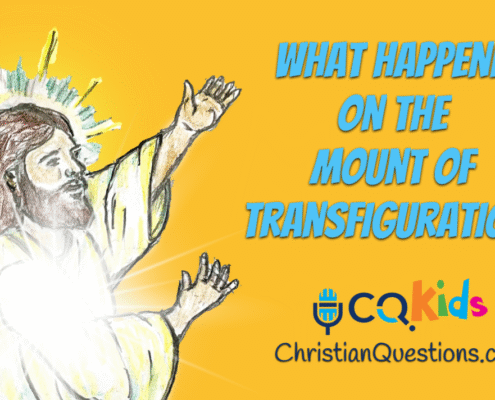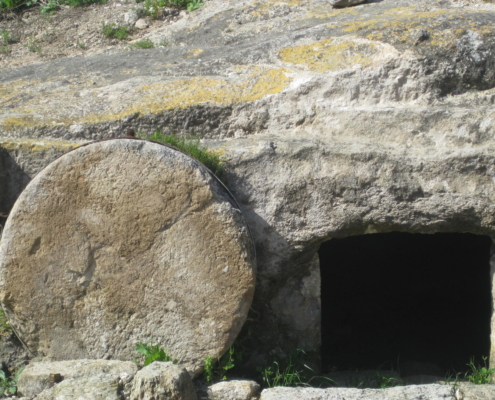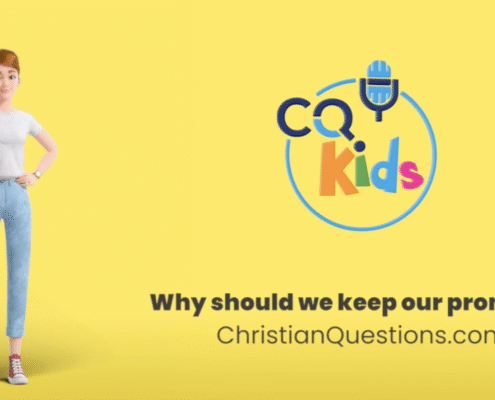VIDEO: What was Jesus like as a child?
Parents and Bible class teachers, Luke records one interesting story when Jesus was 12 years old. Watch this short, animated video with the kids to hear all about it. Subscribe to our channel at ChristianQuestions.com/YouTube and never miss a new video!
Related Videos

VIDEO: What Challenges Exist to Narrow Who Will Be Chosen? Podcast Highlight

VIDEO: Why Did God Call The Roman Soldier Cornelius? Podcast Highlight

Why Are Many Called if Only Few Are Chosen?

VIDEO: Why Are Many Called if Only Few Are Chosen?

VIDEO: What Happened on the Mount of Transfiguration?

VIDEO: Is The Entire World Supposed To Be Reconciled To God Now? Podcast Highlight

VIDEO: What’s The Difference Between Being a “Fan” Of Jesus And Being a True Follower? Podcast Highlight

I Am a Christian, So Who Am I?

VIDEO: I’m a Christian, So Who Am I?
 https://resources.christianquestions.com/wp-content/uploads/2025/05/05193211/Screenshot-2025-05-01-082055.png
704
1255
Teresa Sutherland
https://resources.christianquestions.com/wp-content/uploads/2024/03/28151014/ChristianQuestions-Logo.png
Teresa Sutherland2025-05-05 00:00:502025-05-05 19:47:13VIDEO: What was manna?
https://resources.christianquestions.com/wp-content/uploads/2025/05/05193211/Screenshot-2025-05-01-082055.png
704
1255
Teresa Sutherland
https://resources.christianquestions.com/wp-content/uploads/2024/03/28151014/ChristianQuestions-Logo.png
Teresa Sutherland2025-05-05 00:00:502025-05-05 19:47:13VIDEO: What was manna?
What Was the Message of Jesus After His Resurrection?

VIDEO: What Was the Message of Jesus After His Resurrection?
Ep.1079: Does God Really Love Humanity? (Part I)
How the Lost Sheep and Lost Coin stories teach us God’s character
If you do not have a password, please subscribe to our FREE Premium Content for the Full Edition version of CQ Rewind. The welcome message will contain your password, and a reminder will be sent each week when the CQ Rewind is available online for you to read, print, or download.
CHAPTERS
Theme Scripture: Luke 15:4
One of the most famous Scripture says, “God so loved the world, He gave His only begotten son” for it. For many, the obvious follow-up response is, "Great! Then why is the world more messed up now than ever before?" In truth, God does love humanity. His love is expressed in a profound and eternal plan. While understanding this plan may be challenging, it certainly is not impossible. On many occasions Jesus showed us the magnitude of God’s love and plan. But he showed us in story form. We will look at a series of parables. These are stories Jesus used in Luke 15 and 16 to trace the power and grandeur of God’s love for all of us. By carefully following the symbols in the parables, we can clearly reveal their meaning!
In Part I we uncover the Parables of the Lost Sheep and the Lost Coin. These are both found in Luke 15. The Lost Sheep story is almost universally interpreted that Jesus as the shepherd leaves his 99 sheep behind in the pasture He goes to find the one sheep who strayed away. We love the feeling we get when we see a picture of Jesus accounting for every last one of his flock. The parable goes on to describe a celebration in heaven over the finding of a lost sinner. While such an interpretation provides a wonderful picture, we think it's really missing the big picture of God’s love for humanity.
In the parable, the 99 sheep are described as not needing repentance. Think about the human family. Can we honestly think of 99 individuals in all of history who did not need repentance? There was in fact only one, the man Christ Jesus. That being the case, we realize that the parable's convenient interpretation does not match the words of Jesus in that parable. To find the true meaning of the story we need to be sure we put all of the clearly-stated pieces of it in order.
When we assemble those pieces appropriately. We find a powerful picture of God and His love for the entire human race. Rather than focusing on just one sinner, the parable is actually focusing on an entire race of sinners. It shows us that God not only loves us, but He through the obedience and sacrifice of Jesus holds all of humanity as sacred. What could be better than that?
Check out our June 24, 2019 podcast, “Does God Really Love Humanity? (Part I)” for more. (Then check out Part II!) See how the details of this Lost Sheep story fit together into a powerful narrative of God’s care for us. Further, see how the parable of the Lost Coin follows suit with the same general message but from a whole different perspective. Jesus taught in parables to purposely be mysterious. He also said his true followers would be privileged to understand things others could not. The clear message? God’s love for humanity is genuine, pre-planned and eternal!
Watch Our Episode Preview
Related Episodes

VIDEO: What Challenges Exist to Narrow Who Will Be Chosen? Podcast Highlight

VIDEO: Why Did God Call The Roman Soldier Cornelius? Podcast Highlight

Why Are Many Called if Only Few Are Chosen?

VIDEO: Why Are Many Called if Only Few Are Chosen?

How Can I Cope With Depression?
 https://resources.christianquestions.com/wp-content/uploads/2025/06/24110928/Screenshot-2025-06-18-at-8.59.06%E2%80%AFPM-3.png
1250
2360
Teresa Sutherland
https://resources.christianquestions.com/wp-content/uploads/2024/03/28151014/ChristianQuestions-Logo.png
Teresa Sutherland2025-06-23 00:00:582025-06-24 11:07:27VIDEO: Why should we keep our promises?
https://resources.christianquestions.com/wp-content/uploads/2025/06/24110928/Screenshot-2025-06-18-at-8.59.06%E2%80%AFPM-3.png
1250
2360
Teresa Sutherland
https://resources.christianquestions.com/wp-content/uploads/2024/03/28151014/ChristianQuestions-Logo.png
Teresa Sutherland2025-06-23 00:00:582025-06-24 11:07:27VIDEO: Why should we keep our promises?
VIDEO: How Can I Cope With Depression?

How Do I Reconnect With God?

VIDEO: How Do I Reconnect With God?

VIDEO: What Does The Phrase, “Love Is Not Provoked,” Mean? Podcast Highlight

VIDEO: How Do We Know If We Are Inwardly Arrogant? Podcast Highlight

Can I Really Love Someone I Don’t Like?
VIDEO: Does God Really Love Humanity? (Part 1)
In a recent podcast we looked at the parables of the Lost Sheep and the Lost Coin, both found in Luke 15. While these parables are hard to understand Jesus said his followers would be able to. The clear message? God’s love for humanity is genuine, preplanned and eternal! How do these parables help spell out this plan? Watch this short vlog then listen to the full podcast of the same name for more details.
Related Videos

VIDEO: What Challenges Exist to Narrow Who Will Be Chosen? Podcast Highlight

VIDEO: Why Did God Call The Roman Soldier Cornelius? Podcast Highlight

Why Are Many Called if Only Few Are Chosen?

VIDEO: Why Are Many Called if Only Few Are Chosen?

How Can I Cope With Depression?
 https://resources.christianquestions.com/wp-content/uploads/2025/06/24110928/Screenshot-2025-06-18-at-8.59.06%E2%80%AFPM-3.png
1250
2360
Teresa Sutherland
https://resources.christianquestions.com/wp-content/uploads/2024/03/28151014/ChristianQuestions-Logo.png
Teresa Sutherland2025-06-23 00:00:582025-06-24 11:07:27VIDEO: Why should we keep our promises?
https://resources.christianquestions.com/wp-content/uploads/2025/06/24110928/Screenshot-2025-06-18-at-8.59.06%E2%80%AFPM-3.png
1250
2360
Teresa Sutherland
https://resources.christianquestions.com/wp-content/uploads/2024/03/28151014/ChristianQuestions-Logo.png
Teresa Sutherland2025-06-23 00:00:582025-06-24 11:07:27VIDEO: Why should we keep our promises?
VIDEO: How Can I Cope With Depression?

How Do I Reconnect With God?

VIDEO: How Do I Reconnect With God?

VIDEO: What Does The Phrase, “Love Is Not Provoked,” Mean? Podcast Highlight

VIDEO: How Do We Know If We Are Inwardly Arrogant? Podcast Highlight

Can I Really Love Someone I Don’t Like?
Ep.1078: Is Fatherhood Still Vital?
Appreciating the strength and leadership of fatherhood
If you do not have a password, please subscribe to our FREE Premium Content for the Full Edition version of CQ Rewind. The welcome message will contain your password, and a reminder will be sent each week when the CQ Rewind is available online for you to read, print, or download.
CHAPTERS
Theme Scripture: Proverbs 20:7
The whole idea of fatherhood seems to have changed. In this age of one-parent families in which the present parent is overwhelmingly the mom, we accepted and embraced minimizing the need of a living-at-home dad. I certainly understand not wanting any child to feel inferior because they don’t have a dad in their life, but does that justify marginalizing every dad? So, what is the role of fatherhood? Are there principles and practices of fathering that are concrete and should never change? How do we take the “old-fashioned” scriptural ways and apply them to men raising children in the 21st century? What are the most important things Christian dads should be aware of? How do fathers raise their children in an age where we have now begun to pronounce masculinity as toxic?
Over 20 percent of children in the United States are raised in homes without a father. Other statistics show that dropping out of high school, teenage pregnancy, crime and incarceration rates are excessively higher among individuals who come from fatherless homes. These statistics are tragic but telling. In spite of the resounding and mounting resistance to the whole idea of manliness within a family, one thing should be clear: We need fathers – strong men who care for, go out of their way for and lead their families.
For Christians, a curious question arises out of this dilemma. With fatherhood as such a lynchpin to social success, why doesn’t the Bible have full chapters about it? Certain texts give fathering advice. Some examples are specific verses in Proverbs and sections in the books of Ephesians and Colossians that give sound advice. Why not more? Because fatherhood was a natural expectation for men back then. It was a disgrace to poorly support your family and a rare occurrence to be an absentee dad. Jewish and Christian Men in ancient times knew their place was not only with their families, it was to lead them in a godly way.
The best way to find deep and profound scriptural advice for fathers is to examine a good father from those days. Check out our June 17, 2019 podcast, “Is Fatherhood Still Vital?” for more. We closely observe how Joseph was called upon to be the father of Jesus. We typically see Joseph in almost the same way we would view an “extra” in a movie. Sure, he was there, and sure he had something to do with the story, but Mary and Jesus were the main characters. News flash! Nothing could be further from the truth! Joseph’s fatherhood story reveals clear and specific lessons regarding the “how to” of fatherhood. It is also an inspirational look at a man who willingly took on a monumental task of historic proportions.
Fatherhood is crucial. Whether we are a dad or not, we still need to understand what it requires and how it works. Once we embrace the principles of being a dad, we can use them in our experiences to encourage, to support and even lead others to a more fulfilling life!
Watch Our Episode Preview
Related Episodes

VIDEO: What Challenges Exist to Narrow Who Will Be Chosen? Podcast Highlight

VIDEO: Why Did God Call The Roman Soldier Cornelius? Podcast Highlight

Why Are Many Called if Only Few Are Chosen?

VIDEO: Why Are Many Called if Only Few Are Chosen?

How Can I Cope With Depression?
 https://resources.christianquestions.com/wp-content/uploads/2025/06/24110928/Screenshot-2025-06-18-at-8.59.06%E2%80%AFPM-3.png
1250
2360
Teresa Sutherland
https://resources.christianquestions.com/wp-content/uploads/2024/03/28151014/ChristianQuestions-Logo.png
Teresa Sutherland2025-06-23 00:00:582025-06-24 11:07:27VIDEO: Why should we keep our promises?
https://resources.christianquestions.com/wp-content/uploads/2025/06/24110928/Screenshot-2025-06-18-at-8.59.06%E2%80%AFPM-3.png
1250
2360
Teresa Sutherland
https://resources.christianquestions.com/wp-content/uploads/2024/03/28151014/ChristianQuestions-Logo.png
Teresa Sutherland2025-06-23 00:00:582025-06-24 11:07:27VIDEO: Why should we keep our promises?
VIDEO: How Can I Cope With Depression?

How Do I Reconnect With God?

VIDEO: How Do I Reconnect With God?

How Can I Best Share the Gospel With Others?

VIDEO: How Can I Best Share the Gospel With Others?

VIDEO: What Does The Phrase, “Love Is Not Provoked,” Mean? Podcast Highlight
VIDEO: Is Fatherhood Still Vital?
Over 20 percent of children in the United States are raised in homes without a father. Dropping out of high school, teenage pregnancy, crime and incarceration rates are excessively higher in fatherless environments. We need fathers – strong men who care for, go out of their way for and lead their families. Watch this short vlog then listen to the full podcast of the same name for more details.
Related Videos

VIDEO: What Challenges Exist to Narrow Who Will Be Chosen? Podcast Highlight

VIDEO: Why Did God Call The Roman Soldier Cornelius? Podcast Highlight

Why Are Many Called if Only Few Are Chosen?

VIDEO: Why Are Many Called if Only Few Are Chosen?

How Can I Cope With Depression?
 https://resources.christianquestions.com/wp-content/uploads/2025/06/24110928/Screenshot-2025-06-18-at-8.59.06%E2%80%AFPM-3.png
1250
2360
Teresa Sutherland
https://resources.christianquestions.com/wp-content/uploads/2024/03/28151014/ChristianQuestions-Logo.png
Teresa Sutherland2025-06-23 00:00:582025-06-24 11:07:27VIDEO: Why should we keep our promises?
https://resources.christianquestions.com/wp-content/uploads/2025/06/24110928/Screenshot-2025-06-18-at-8.59.06%E2%80%AFPM-3.png
1250
2360
Teresa Sutherland
https://resources.christianquestions.com/wp-content/uploads/2024/03/28151014/ChristianQuestions-Logo.png
Teresa Sutherland2025-06-23 00:00:582025-06-24 11:07:27VIDEO: Why should we keep our promises?
VIDEO: How Can I Cope With Depression?

How Do I Reconnect With God?

VIDEO: How Do I Reconnect With God?

How Can I Best Share the Gospel With Others?

VIDEO: How Can I Best Share the Gospel With Others?

VIDEO: What Does The Phrase, “Love Is Not Provoked,” Mean? Podcast Highlight
VIDEO: Is the Bible Full of Contradictions?
Listen in as Christian Questions Host, Rick, and CQ Contributor, Julie, discuss two questions related to our recent podcasts on Bible contradictions and demonstrate a methodology that can be used to understand how to see how the scriptures compliment instead of contradict each other. Here are some questions we answer in our conversation: 2:40 Why wouldn’t a book from God be flawless and therefore totally reliable? 6:10 Here are some possible reasons for discrepancies between seemingly “contradictory” scriptures. 11:33 The Bible is full of human sacrifices and killing. How can that be acceptable?
Related Videos

VIDEO: What Challenges Exist to Narrow Who Will Be Chosen? Podcast Highlight

VIDEO: Why Did God Call The Roman Soldier Cornelius? Podcast Highlight

Why Are Many Called if Only Few Are Chosen?

VIDEO: Why Are Many Called if Only Few Are Chosen?

How Can I Cope With Depression?
 https://resources.christianquestions.com/wp-content/uploads/2025/06/24110928/Screenshot-2025-06-18-at-8.59.06%E2%80%AFPM-3.png
1250
2360
Teresa Sutherland
https://resources.christianquestions.com/wp-content/uploads/2024/03/28151014/ChristianQuestions-Logo.png
Teresa Sutherland2025-06-23 00:00:582025-06-24 11:07:27VIDEO: Why should we keep our promises?
https://resources.christianquestions.com/wp-content/uploads/2025/06/24110928/Screenshot-2025-06-18-at-8.59.06%E2%80%AFPM-3.png
1250
2360
Teresa Sutherland
https://resources.christianquestions.com/wp-content/uploads/2024/03/28151014/ChristianQuestions-Logo.png
Teresa Sutherland2025-06-23 00:00:582025-06-24 11:07:27VIDEO: Why should we keep our promises?
VIDEO: How Can I Cope With Depression?

How Do I Reconnect With God?

VIDEO: How Do I Reconnect With God?

How Can I Best Share the Gospel With Others?

VIDEO: How Can I Best Share the Gospel With Others?

VIDEO: What Does The Phrase, “Love Is Not Provoked,” Mean? Podcast Highlight
VIDEO: Why should we obey our parents?
Mom and Dad know more than we think (or give credit for)! Parents and Bible class teachers, this short, animated, popular video explains why we should pay attention to what our parents have to say. Subscribe to our channel at ChristianQuestions.com/YouTube and never miss a new video!
Related Videos

VIDEO: What Challenges Exist to Narrow Who Will Be Chosen? Podcast Highlight

VIDEO: Why Did God Call The Roman Soldier Cornelius? Podcast Highlight

Why Are Many Called if Only Few Are Chosen?

VIDEO: Why Are Many Called if Only Few Are Chosen?

How Can I Cope With Depression?
 https://resources.christianquestions.com/wp-content/uploads/2025/06/24110928/Screenshot-2025-06-18-at-8.59.06%E2%80%AFPM-3.png
1250
2360
Teresa Sutherland
https://resources.christianquestions.com/wp-content/uploads/2024/03/28151014/ChristianQuestions-Logo.png
Teresa Sutherland2025-06-23 00:00:582025-06-24 11:07:27VIDEO: Why should we keep our promises?
https://resources.christianquestions.com/wp-content/uploads/2025/06/24110928/Screenshot-2025-06-18-at-8.59.06%E2%80%AFPM-3.png
1250
2360
Teresa Sutherland
https://resources.christianquestions.com/wp-content/uploads/2024/03/28151014/ChristianQuestions-Logo.png
Teresa Sutherland2025-06-23 00:00:582025-06-24 11:07:27VIDEO: Why should we keep our promises?
VIDEO: How Can I Cope With Depression?

How Do I Reconnect With God?

VIDEO: How Do I Reconnect With God?

How Can I Best Share the Gospel With Others?

VIDEO: How Can I Best Share the Gospel With Others?

VIDEO: What Does The Phrase, “Love Is Not Provoked,” Mean? Podcast Highlight
VIDEO: We Are Christians, But Are We Unified?
Is unity easy? No. Jesus warned us of “wolves in sheep’s clothing”. The rest of the New Testament alerts us to the dangers Jesus’ followers would continually face. Christian unity would be challenged by smooth talkers, worldly minded leaders, vain philosophies and false doctrines. Unity with those who promote such things is not what Jesus wanted. So, can Christian unity be a reality? It can and is absolutely required. How? Watch this short vlog then listen to the full podcast of the same name for more details.
Related Videos

VIDEO: What Challenges Exist to Narrow Who Will Be Chosen? Podcast Highlight

VIDEO: Why Did God Call The Roman Soldier Cornelius? Podcast Highlight

Why Are Many Called if Only Few Are Chosen?

VIDEO: Why Are Many Called if Only Few Are Chosen?

How Can I Cope With Depression?
 https://resources.christianquestions.com/wp-content/uploads/2025/06/24110928/Screenshot-2025-06-18-at-8.59.06%E2%80%AFPM-3.png
1250
2360
Teresa Sutherland
https://resources.christianquestions.com/wp-content/uploads/2024/03/28151014/ChristianQuestions-Logo.png
Teresa Sutherland2025-06-23 00:00:582025-06-24 11:07:27VIDEO: Why should we keep our promises?
https://resources.christianquestions.com/wp-content/uploads/2025/06/24110928/Screenshot-2025-06-18-at-8.59.06%E2%80%AFPM-3.png
1250
2360
Teresa Sutherland
https://resources.christianquestions.com/wp-content/uploads/2024/03/28151014/ChristianQuestions-Logo.png
Teresa Sutherland2025-06-23 00:00:582025-06-24 11:07:27VIDEO: Why should we keep our promises?
VIDEO: How Can I Cope With Depression?

VIDEO: How Does Peter’s Brokenness Help Us Reconnect With God After We’ve Lost Our Way? Highlight

How Do I Reconnect With God?

VIDEO: How Do I Reconnect With God?

How Can I Best Share the Gospel With Others?

VIDEO: How Can I Best Share the Gospel With Others?
Ep.1077: We Are Christians, But Are We Unified?
Unraveling what Christian unity is and is not and how to apply it
If you do not have a password, please subscribe to our FREE Premium Content for the Full Edition version of CQ Rewind. The welcome message will contain your password, and a reminder will be sent each week when the CQ Rewind is available online for you to read, print, or download.
CHAPTERS
Theme Scripture: Ephesians 4:13
Christian unity. It has such a reassuring sound to it. To be unified in Christ is to be in a position of not merely mutual acceptance but in a position of locking arms and co-laboring for the accomplishment of something far bigger than any one of us The problem is the reality in which we live. There are so many approaches and opinions on what Christianity is and even stands for, the idea of unity gets lost in the confusion of doctrines and denominations. Is the state of Christianity supposed to be like this? What do the Scriptures say Christian unity really is? What should we be doing to accomplish it? When do doctrine, character and tradition belong together? When are there legitimate reasons for such things to divide?
Be unified!
Jesus was pretty clear when it came down to how his followers were to treat each other once he was gone. The lessons he taught on his last night before crucifixion were not only inspirational, they were pointed. First was the example of washing his disciple’s feet. Jesus, the Lord and Master of all, was the one to get down on his knees and serve his followers with this most humble hospitality ritual. The takeaway was clear – none of you should think himself too good to do the most menial things while serving another. Jesus gave us this lesson to be a foundational principle for our unity as his followers. The other experiences of that last evening together only served to enhance Jesus message - I am leaving and you all need to serve, rely on and support each other. Be unified!
It's not that simple. But it is required.
Reviewing these lessons makes Christian unity seem simple and straightforward. Unfortunately, it is not. Jesus also warned us that “wolves in sheep’s clothing” would come in among his flock to destroy them. To make matters worse, the rest of the New Testament is full of further warnings regarding the dangers Jesus’ followers would face throughout the age of the gospel message. Smooth talking and wordly-minded leaders would challenge Christian unity. Vain philosophies and false doctrines woudl test Christian unity. The Scriptures tell us that seeking unity with those who promote such things is not only counter-productive, it is downright dangerous!
With all of this being said, it sounds like Christian unity cannot be a reality. We submit it not only is possible...it is required. How do we bring these two conflicting thoughts into harmony? Check out our June 10, 2019 podcast, “We are Christians, But Are We United?” for more. We take a practical look at what Christian unity is supposed to be built upon, and what it should produce. We also identify the things that make it difficult, and he things that alert us to avoid even trying. It requires wisdom and insight to be unified in the way Jesus showed us. Follow along with us and learn where to begin!
Watch Our Episode Preview
Related Episodes

VIDEO: What Challenges Exist to Narrow Who Will Be Chosen? Podcast Highlight

VIDEO: Why Did God Call The Roman Soldier Cornelius? Podcast Highlight

Why Are Many Called if Only Few Are Chosen?

VIDEO: Why Are Many Called if Only Few Are Chosen?

How Can I Cope With Depression?
 https://resources.christianquestions.com/wp-content/uploads/2025/06/24110928/Screenshot-2025-06-18-at-8.59.06%E2%80%AFPM-3.png
1250
2360
Teresa Sutherland
https://resources.christianquestions.com/wp-content/uploads/2024/03/28151014/ChristianQuestions-Logo.png
Teresa Sutherland2025-06-23 00:00:582025-06-24 11:07:27VIDEO: Why should we keep our promises?
https://resources.christianquestions.com/wp-content/uploads/2025/06/24110928/Screenshot-2025-06-18-at-8.59.06%E2%80%AFPM-3.png
1250
2360
Teresa Sutherland
https://resources.christianquestions.com/wp-content/uploads/2024/03/28151014/ChristianQuestions-Logo.png
Teresa Sutherland2025-06-23 00:00:582025-06-24 11:07:27VIDEO: Why should we keep our promises?
VIDEO: How Can I Cope With Depression?

VIDEO: How Does Peter’s Brokenness Help Us Reconnect With God After We’ve Lost Our Way? Highlight

How Do I Reconnect With God?

VIDEO: How Do I Reconnect With God?

How Can I Best Share the Gospel With Others?

VIDEO: How Can I Best Share the Gospel With Others?
VIDEO: Why should we forgive others?
Forgiveness can be a tough thing when we’ve been wronged, but if Jesus loved and forgave his enemies, then we should do our very best to copy him. Parents and Bible class teachers, this short, animated video explains the importance of forgiveness in an engaging way. Subscribe to our channel at ChristianQuestions.com/YouTube and never miss a new video!
Related Videos

VIDEO: What Challenges Exist to Narrow Who Will Be Chosen? Podcast Highlight

VIDEO: Why Did God Call The Roman Soldier Cornelius? Podcast Highlight

Why Are Many Called if Only Few Are Chosen?

VIDEO: Why Are Many Called if Only Few Are Chosen?

How Can I Cope With Depression?
 https://resources.christianquestions.com/wp-content/uploads/2025/06/24110928/Screenshot-2025-06-18-at-8.59.06%E2%80%AFPM-3.png
1250
2360
Teresa Sutherland
https://resources.christianquestions.com/wp-content/uploads/2024/03/28151014/ChristianQuestions-Logo.png
Teresa Sutherland2025-06-23 00:00:582025-06-24 11:07:27VIDEO: Why should we keep our promises?
https://resources.christianquestions.com/wp-content/uploads/2025/06/24110928/Screenshot-2025-06-18-at-8.59.06%E2%80%AFPM-3.png
1250
2360
Teresa Sutherland
https://resources.christianquestions.com/wp-content/uploads/2024/03/28151014/ChristianQuestions-Logo.png
Teresa Sutherland2025-06-23 00:00:582025-06-24 11:07:27VIDEO: Why should we keep our promises?
VIDEO: How Can I Cope With Depression?

VIDEO: How Does Peter’s Brokenness Help Us Reconnect With God After We’ve Lost Our Way? Highlight

How Do I Reconnect With God?

VIDEO: How Do I Reconnect With God?

How Can I Best Share the Gospel With Others?

VIDEO: How Can I Best Share the Gospel With Others?
Ep.1076: Does the Bible Contradict Itself? Contradictions (Part II)
Child sacrifice, killing and lying – apparent contradictions resolved
If you do not have a password, please subscribe to our FREE Premium Content for the Full Edition version of CQ Rewind. The welcome message will contain your password, and a reminder will be sent each week when the CQ Rewind is available online for you to read, print, or download.
CHAPTERS
Theme Scripture: Romans 15:4
Several weeks ago (see Part 1) we began a journey down what might be considered a tricky path as we took a first step towards addressing an enormous subject – perceived Bible contradictions. This is a huge undertaking, not only because of the Bible’s very nature, being ancient and authored by several over many centuries, but because of the emotional reactions from the opposing sides as well. Many people and groups have “exposed” what they have concluded are blatant contradictions within its pages. They are not shy about advertising their findings – just look online! Then there are those of us who do believe that the Bible IS the inspired word of God and are convinced that the scriptures are sound and harmonious. Part 2 of the task we are taking on is simple – address these reported contradictions one at a time in an effort to clear up what we believe are errant conclusions.
Really?!?!
The Bible has in its pages many accounts that upon reading could easily leave you scratching your head and wondering why God would do THAT. Because of this, many assert the God of the Old Testament was basically a monster. They conclude this based on their interpretations of several Scriptures they say show God as a bloodthirsty sovereign. One such example is the account of God calling Abraham to sacrifice his son Isaac. What kind of God would require such a thing? The answer they give is only a monstrous ruler would do that.
I agree. Only a monster would do that. Let’s remember one detail that seems to be continually overlooked regarding this story. That is, God never intended and did not allow Abraham to do any harm to his son Isaac. As a matter of fact, God had an angel standing at the ready and an actual sacrifice available to fulfill His request. So, was God just toying with Abraham? No. There are many reasons for this whole scenario to have unfolded in this way. We will touch on just one.
Abraham was called to follow God out of an environment of deep and monstrous idolatry. In that environment, sacrificing children to some stone or wooden image was a very common occurrence. God called Abraham to be loyal to Him and to no other. In God’s demonstration of His love and power, He dramatically showed Abraham that He was a God who did NOT desire or require the taking of innocent life. He instead was the preserver of such life. This would be dramatically demonstrated again thousands of years later when Jesus (a descendant of Abraham and Isaac) gave his life to redeem the lives of all humanity.
This is just one example with only a small piece of reasoning attached to it. There are several others, some even more dramatic than this! Check out our June 3, 12019 podcast, “Does the Bible Contradict Itself? Part II” for more. We look at how God really views things like human sacrifice, killing and lying. Walk with us for a reasoned approach on these difficult Scriptures and see for yourself!
Watch Our Episode Preview
Related Episodes

VIDEO: What Challenges Exist to Narrow Who Will Be Chosen? Podcast Highlight

VIDEO: Why Did God Call The Roman Soldier Cornelius? Podcast Highlight

Why Are Many Called if Only Few Are Chosen?

VIDEO: Why Are Many Called if Only Few Are Chosen?

VIDEO: Why Is Isolation Bad For People Who Are Depressed? Podcast Highlight

How Can I Cope With Depression?
 https://resources.christianquestions.com/wp-content/uploads/2025/06/24110928/Screenshot-2025-06-18-at-8.59.06%E2%80%AFPM-3.png
1250
2360
Teresa Sutherland
https://resources.christianquestions.com/wp-content/uploads/2024/03/28151014/ChristianQuestions-Logo.png
Teresa Sutherland2025-06-23 00:00:582025-06-24 11:07:27VIDEO: Why should we keep our promises?
https://resources.christianquestions.com/wp-content/uploads/2025/06/24110928/Screenshot-2025-06-18-at-8.59.06%E2%80%AFPM-3.png
1250
2360
Teresa Sutherland
https://resources.christianquestions.com/wp-content/uploads/2024/03/28151014/ChristianQuestions-Logo.png
Teresa Sutherland2025-06-23 00:00:582025-06-24 11:07:27VIDEO: Why should we keep our promises?
VIDEO: How Can I Cope With Depression?

VIDEO: How Does Peter’s Brokenness Help Us Reconnect With God After We’ve Lost Our Way? Highlight

How Do I Reconnect With God?

VIDEO: How Do I Reconnect With God?

How Can I Best Share the Gospel With Others?
VIDEO: Does the Bible Contradict Itself? (Part II)
There are many biblical accounts that could easily leave you scratching your head and wondering “why would God do that?’ As a result many assert that God is basically a monster. In a recent podcast, we dealt with one example: God telling Abraham to sacrifice his son Isaac. What kind of God would require such a thing? Watch this short vlog then listen to the full podcast of the same name for more details.
Related Videos

VIDEO: What Challenges Exist to Narrow Who Will Be Chosen? Podcast Highlight

VIDEO: Why Did God Call The Roman Soldier Cornelius? Podcast Highlight

Why Are Many Called if Only Few Are Chosen?

VIDEO: Why Are Many Called if Only Few Are Chosen?

VIDEO: Why Is Isolation Bad For People Who Are Depressed? Podcast Highlight

How Can I Cope With Depression?
 https://resources.christianquestions.com/wp-content/uploads/2025/06/24110928/Screenshot-2025-06-18-at-8.59.06%E2%80%AFPM-3.png
1250
2360
Teresa Sutherland
https://resources.christianquestions.com/wp-content/uploads/2024/03/28151014/ChristianQuestions-Logo.png
Teresa Sutherland2025-06-23 00:00:582025-06-24 11:07:27VIDEO: Why should we keep our promises?
https://resources.christianquestions.com/wp-content/uploads/2025/06/24110928/Screenshot-2025-06-18-at-8.59.06%E2%80%AFPM-3.png
1250
2360
Teresa Sutherland
https://resources.christianquestions.com/wp-content/uploads/2024/03/28151014/ChristianQuestions-Logo.png
Teresa Sutherland2025-06-23 00:00:582025-06-24 11:07:27VIDEO: Why should we keep our promises?
VIDEO: How Can I Cope With Depression?

VIDEO: How Does Peter’s Brokenness Help Us Reconnect With God After We’ve Lost Our Way? Highlight

How Do I Reconnect With God?

VIDEO: How Do I Reconnect With God?

How Can I Best Share the Gospel With Others?
Bible Study
Watch & Listen
Newsletter & CQ Rewind
Sign up for the CQ Newsletter and get the CQ Rewind Show Notes emailed each week as they become available, OR text to join:
Text CQREWIND to 22828.
This site uses cookies. By continuing to browse the site, you are agreeing to our use of cookies.
Accept settingsCookie and Privacy Settings
We may request cookies to be set on your device. We use cookies to let us know when you visit our websites, how you interact with us, to enrich your user experience, and to customize your relationship with our website.
Click on the different category headings to find out more. You can also change some of your preferences. Note that blocking some types of cookies may impact your experience on our websites and the services we are able to offer.
These cookies are strictly necessary to provide you with services available through our website and to use some of its features.
Because these cookies are strictly necessary to deliver the website, refusing them will have impact how our site functions. You always can block or delete cookies by changing your browser settings and force blocking all cookies on this website. But this will always prompt you to accept/refuse cookies when revisiting our site.
We fully respect if you want to refuse cookies but to avoid asking you again and again kindly allow us to store a cookie for that. You are free to opt out any time or opt in for other cookies to get a better experience. If you refuse cookies we will remove all set cookies in our domain.
We provide you with a list of stored cookies on your computer in our domain so you can check what we stored. Due to security reasons we are not able to show or modify cookies from other domains. You can check these in your browser security settings.
We also use different external services like Google Webfonts, Google Maps, and external Video providers. Since these providers may collect personal data like your IP address we allow you to block them here. Please be aware that this might heavily reduce the functionality and appearance of our site. Changes will take effect once you reload the page.
Google Webfont Settings:
Google Map Settings:
Google reCaptcha Settings:
Vimeo and Youtube video embeds:









